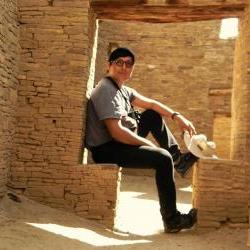- About Archives
- About SAA
- Careers
- Education
- Publications
- Advocacy
- Membership
***Voting is NOW open! Members will receive an email from SAA with voting instructions. Voting is open until July 14.****
Colleen Cook
Archives Coordinator
Aqua Caliente Band of Cahuilla Indian
Palm Springs, California
Bio: I am the Archives Coordinator for the Agua Caliente Band of Cahuilla Indians Tribal Historic Preservation Office. In this role I manage a Cultural Register of the tribe, a reference archive and library, and records management for the department. I assist and advise on historical research and records activities for my department, the tribe, and local cultural institutions. I received my MLIS from San Jose State in 2011 and have worked in a variety of archives and libraries since. I am also a member of the Society of California Archivists and the Association of Tribal Archives, Libraries, and Museums.
Statement: It has been a pleasure to serve on the NAAR steering committee for the past two years. I have had the opportunity to learn more about the priorities, interests, and challenges of this roundtable. The Protocols are continuing to evolve and as Vice-Chair/Chair-Elect I would continue to advocate for and discuss the Protocols with the Roundtable and collaborators. I would also continue to look for ways to involve, support, and advocate for Native Archival concerns. Finally, I would strive to provide overall leadership for the group in conjunction with past chairs, SAA, steering committee members, and the group at large.
 Stephen R. Curley
Stephen R. Curley
Archival Contractor
Western Archaeological and Conservation Center (WACC)
Bio: Stephen R. Curley, MLS is a member of the Navajo Nation and is an Archival Contractor at the Western Archaeological and Conservation Center (WACC) in Tucson, AZ where he handles National Park Service Central Files and Natural Resource Records. As an American Indian who finds value in being proactive in both his culture and in society, Stephen is committed to being of service to American Indian communities with respect to their archives and museums in order to bolster and develop those institutions and systems associated with them. He finds it imperative for tribes, as nations, to bolster such information institutions for themselves so they can effectively continue to cultivate not only a sense of cultural identity, but also a national identity.
While a graduate student at the University of Arizona, Stephen was attracted to the archives, as a tribal-centric scholar, since information infrastructures are still quite nascent with respect to tribal institutions. At this time, Stephen with other colleagues instituted the first-ever American Indian Library Association student chapter which operated under the auspices and direction of its national organization. Since tribal information institutions (archives, libraries, and museums) are developing yet, it is an exciting time to implement their strengths and to bolster the areas considered lacking in creative and new directions. As a new, yet motivated, professional, Stephen is working towards contributing resolve to these fundamental questions that tribes will be answering.
Statement: My vision for NAAR is for it to be an easily approachable and accessible resource to current and future archivists and relevant disciplines. In order for NAAR to be effective it must reach further outward to other disciplines so that archivy and its methodologies are understood and valued therein by American Indians. I propose that NAAR develop outreach initiatives to tribal governments and produce an educational module for the Native Nations Institute regarding the importance of the archives and its applications in tribal settings. Indian Country is vast and diverse; the NAAR must network with entities and agencies whom are established and trusted in tribal communities and governments alike. Moreover, my vision for NAAR is to be of use and aid to indigenous peoples who are rebuilding their nations.
Adam Minakowski
Reference Archivist
Smithsonian Institution’s National Anthropological Archives
 Bio: Adam Minakowski is the reference archivist at the Smithsonian Institution’s National Anthropological Archives (NAA), a position he has held since 2012. In this position he is responsible for assisting visiting researchers and community members with gaining access to NAA collections as well as fielding remote reference questions from researchers worldwide. Before joining the Smithsonian, Adam worked on the library, social media, and textual research room staffs at the National Archives and Records Administration while completing his M.L.S degree with an Archives and Records Management specialization at the University of Maryland, College Park. He also assisted in setting acquisition and processing practices for a new archival repository focused on the history of African-American Art at the David C. Driskell Center at the University of Maryland. He is a member of the Mid-Atlantic Regional Archives Conference (MARAC) and the Society for American Archivists (SAA).
Bio: Adam Minakowski is the reference archivist at the Smithsonian Institution’s National Anthropological Archives (NAA), a position he has held since 2012. In this position he is responsible for assisting visiting researchers and community members with gaining access to NAA collections as well as fielding remote reference questions from researchers worldwide. Before joining the Smithsonian, Adam worked on the library, social media, and textual research room staffs at the National Archives and Records Administration while completing his M.L.S degree with an Archives and Records Management specialization at the University of Maryland, College Park. He also assisted in setting acquisition and processing practices for a new archival repository focused on the history of African-American Art at the David C. Driskell Center at the University of Maryland. He is a member of the Mid-Atlantic Regional Archives Conference (MARAC) and the Society for American Archivists (SAA).
Statement: Working with one of the nation’s largest repositories of materials relating to indigenous communities and assisting members of those communities gain access to those materials, I view NAAR as a focal point of ideas and activities that can develop a set of best practices for use by my institution as well as many others. I believe that it’s an important forum for engaging in discussion of how to best provide respectful care of indigenous archives as well as access to that material for both indigenous and non-indigenous researchers. To that end, I would like to see NAAR further refine and work toward wider adoption of the “Protocols for Native American Archival Materials.” I can also see the NAAR being a useful outreach tool helping to raise awareness of repositories of indigenous material among both the archival community and indigenous communities nationwide. It would be good to see NAAR continue to work with its allied organizations, groups, and programs to further these outreach efforts.
 Ricardo L. Punzalan
Ricardo L. Punzalan
Assistant Professor
University of Maryland College of Information Studies
Bio: Ricardo L. Punzalan is an assistant professor at the University of Maryland College of Information Studies, where he teaches courses on archives and digital curation. He has been a member of NAAR since 2010. He holds a PhD in information from the University of Michigan School of Information. In addition to an MLIS from the University of the Philippines, he completed two certificates of graduate studies at Michigan, one in science, technology, and society (STS) and another in museum studies. Prior to his doctoral studies, he served in faculty of the University of the Philippines School of Library and Information Studies. His area of research includes understanding the relationship of archives and collective memory, the politics and dynamics of digitization decision-making in collaborative and inter-institutional settings, and the uses and users of digitized archival images. His current research examines “virtual reunification” as a strategy to provide integrated access to dispersed ethnographic archival images online. He is also developing ways to effectively document, evaluate, and articulate the impact and outcomes of digitized ethnographic archives. His articles have been published in the American Archivist, Library Quarterly, Archives and Manuscripts, Archivaria, and Archival Science.
Statement: NAAR has been at the forefront of promoting respectful and responsible preservation and access of cultural heritage collections. I wish to facilitate developing greater capacities for NAAR memberships and allies to understand and articulate both the positive and negative the impacts of digitizing Indigenous collections in providing online access to source communities. Over the last two decades, libraries, archives, and museums (LAM) have made large portions of their anthropological holdings available in digitized formats. However, the development of tools and models for assessing the impact and usability of these digital assets has not kept pace, particularly in taking into account the cultural needs of source communities. With my involvement at NAAR, I propose to develop a model for assessing digital ethnographic archives and toolkits for implementing evaluation projects that can be freely available in order to help cultural heritage professionals and administrators to evaluate the effectiveness of their digitization and online efforts.